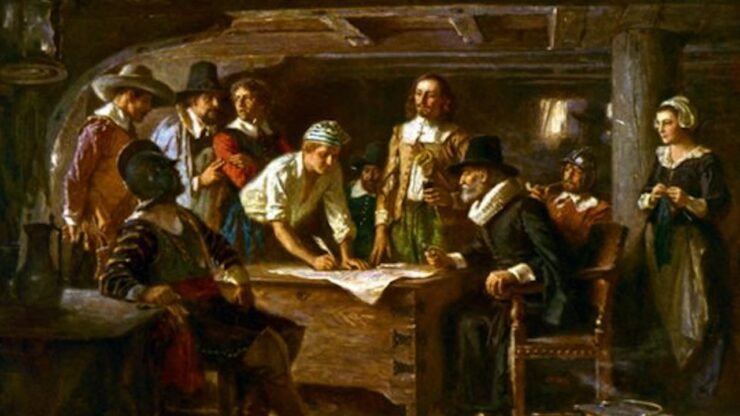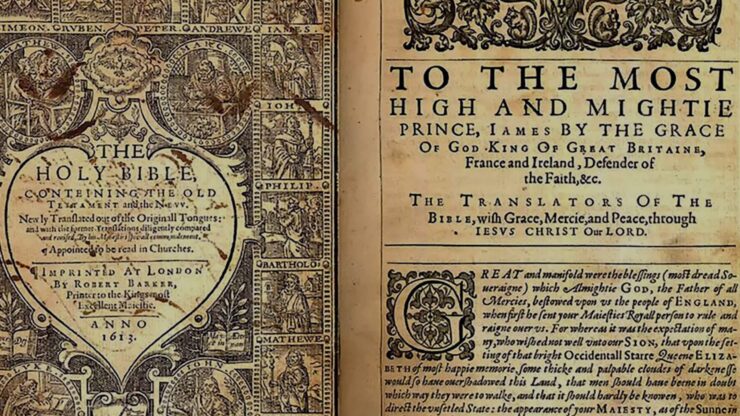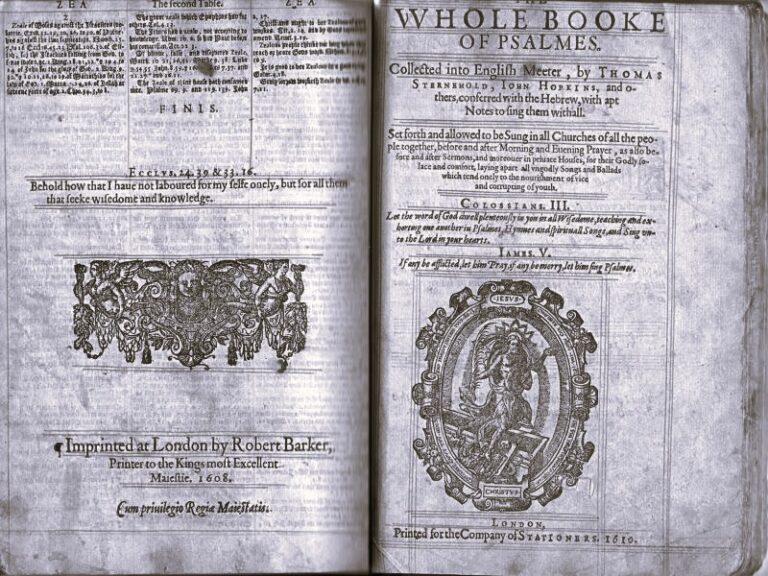The Geneva Bible, a popular English translation in the 16th century, faced unexpected opposition from none other than King James I. This blog post delves into the reasons behind this royal disapproval, exploring the historical context, political motivations, and religious differences that fueled King James’s dislike for this influential text.
We’ll unravel the intricate web of factors, from theological debates to court politics, to understand why the Geneva Bible found itself out of favor with the English crown. So, buckle up for a fascinating journey through history, politics, and religion, as we uncover the story behind a king and his disapproval of a Bible.
Historical Context of the Geneva Bible
The Geneva Bible, first printed in 1560, was not just a religious text but also a reflection of the political and religious turmoil of its time.
Origins and Early Reception

The Geneva Bible emerged during a period of religious reformation and political upheaval. It was the first English Bible to use verse numbers and included extensive marginal notes. Its popularity soared among Protestant reformers.
- The Geneva Bible was translated by English Protestants in exile, fleeing the persecution of Queen Mary I. Its translation was a collaborative effort, reflecting the theological perspectives of its creators.
- Upon its publication, the Geneva Bible quickly became popular among English Protestants. Its clear language and helpful annotations made it accessible to the general public.
Comparison with Other Versions
The Geneva Bible was not the only English translation available at the time. The Great Bible and the Bishops’ Bible were other notable versions.
- The Great Bible, authorized by Henry VIII, was the first English Bible sanctioned for public use. However, its language was less accessible compared to the Geneva Bible.
- The Bishops’ Bible, initiated by Elizabeth I, aimed to replace the Geneva Bible. Despite its royal backing, it failed to gain the same level of popularity due to its less engaging annotations and translation.
King James’s Personal and Political Motivations
King James’s dislike for the Geneva Bible was influenced by both personal beliefs and political considerations.
Religious Beliefs and Preferences
King James’s religious views played a crucial role in his disdain for the Geneva Bible.
- As a firm believer in the divine right of kings, King James found the marginal notes in the Geneva Bible, which often questioned the absolute authority of monarchs, to be seditious.
- King James also preferred a more hierarchical church structure, which was reflected in his support for the Church of England. The Geneva Bible, with its Puritan leanings, was at odds with his views.
Political Strategy and Control
The king’s political objectives were also a significant factor in his opposition to the Geneva Bible.
- By promoting a new Bible translation, King James aimed to assert his authority over religious matters and diminish the influence of radical Protestant factions.
- The new translation, which would become the King James Bible, was also a tool to unify the various religious groups under his rule, thereby strengthening his political control.
Theological Disputes and Interpretations
Theological differences between the Geneva Bible and King James’s beliefs contributed to his aversion.
Interpretations of Scripture
The Geneva Bible’s interpretations of certain scriptures were a source of contention for King James.
- The marginal notes in the Geneva Bible often reflected a Calvinist perspective, emphasizing predestination and the limited role of monarchs in religious matters. This clashed with King James’s more traditional Anglican views.
- Certain passages in the Geneva Bible were interpreted in a way that seemed to challenge the authority of kings, which King James, advocating the divine right of kings, found unacceptable.
The Role of Monarchs in Religion

The Geneva Bible’s stance on the role of monarchs in religious matters was particularly problematic for King James.
- The annotations in the Geneva Bible sometimes implied that monarchs were subject to the will of God and the church, a view that threatened the absolute authority King James sought to uphold.
- King James believed in a strong connection between the monarchy and the church, with the monarch as the supreme religious authority. This belief was fundamentally at odds with the more democratic and congregationalist views expressed in the Geneva Bible.
Influence of Advisors and Court Politics
King James’s court and advisors played a crucial role in shaping his views towards the Geneva Bible.
Advisors’ Influence on Religious Policy
The king’s advisors, many of whom were Anglican clergymen, had a significant impact on his religious policies.
- Influential advisors like Richard Bancroft, who later oversaw the translation of the King James Bible, were staunch opponents of Puritanism and the Geneva Bible. Their views undoubtedly influenced King James.
- The advisors’ support for a new Bible translation was partly driven by their desire to curb the influence of the Geneva Bible and its associated theological perspectives.
Court Politics and Religious Factions
The dynamics of court politics also played a role in King James’s stance on the Geneva Bible.
- The English court was a battleground of religious factions, with Anglicans and Puritans vying for influence. King James’s rejection of the Geneva Bible can be seen as a move to placate the Anglican faction and assert his authority.
- The king’s decision to commission a new Bible translation was also a strategic move to diminish the influence of Puritan elements within the court and the broader society.
The Geneva Bible’s Marginal Notes Controversy
The marginal notes in the Geneva Bible were a major point of contention for King James.
Content and Tone of the Notes
The notes in the Geneva Bible were not just explanatory but also interpretative, often reflecting a specific theological viewpoint.
- The marginal notes were seen as radical by some, particularly those that seemed to challenge the authority of monarchs and promote a more congregationalist approach to church governance.
- The tone of the notes, sometimes critical of monarchial power and supportive of resistance to tyranny, was perceived as seditious by King James and his advisors.
Impact on Readers and Society
The influence of these notes on the readers and society was significant and concerning for the monarchy.
- The notes made the Geneva Bible not just a religious text but also a manifesto of sorts for certain radical Protestant groups. This was alarming for a monarch who sought to maintain absolute authority.
- The widespread availability and popularity of the Geneva Bible meant that these ideas were disseminating widely, potentially inciting dissent and challenging the established religious and political order.
The Role of the Church of England
The Church of England’s position and policies were integral to King James’s opposition to the Geneva Bible.
Church Hierarchy and Authority
The structure and authority of the Church of England were at odds with the more egalitarian approach of the Geneva Bible.
- The Church of England, with its hierarchical structure and emphasis on the monarch’s supreme authority in religious matters, was fundamentally different from the congregationalist and somewhat democratic approach reflected in the Geneva Bible.
- King James, as the head of the Church of England, sought to reinforce this hierarchical structure and resist any challenges to it, as represented by the Geneva Bible.
Anglican Theology vs. Puritan Leanings
The theological differences between Anglicanism and Puritanism also played a role.
- The Geneva Bible’s Puritan leanings were in contrast to the more moderate Anglican theology favored by King James and the Church of England.
- By opposing the Geneva Bible, King James was also taking a stand against the growing influence of Puritanism within England, which he viewed as a threat to the established church and his authority.
King James’s Vision for a Unified Church

King James’s desire for religious unity under his rule was a key factor in his rejection of the Geneva Bible.
Unification of Religious Factions
King James aimed to bring together the different religious factions under a single, unified church.
- By commissioning the King James Bible, he sought to create a common religious text that would be acceptable to both Anglicans and moderate Puritans, thereby reducing religious divisions.
- The Geneva Bible, with its strong Puritan associations, was seen as an obstacle to this unification process.
The King James Bible as a Political Tool
The creation of the King James Bible was as much a political move as it was a religious one.
- The new translation was intended to assert the king’s authority over religious matters and diminish the influence of radical religious groups.
- By overseeing the translation of a new Bible, King James was able to promote his vision of a unified, hierarchical church aligned with the monarchy.
The Impact of the Reformation on King James’s Views

The broader context of the Reformation influenced King James’s attitudes towards the Geneva Bible.
Reformation Ideals and Monarchical Power
The Reformation brought about a shift in religious power dynamics, which impacted King James’s views.
- The Reformation’s emphasis on scripture and individual interpretation of the Bible challenged the traditional authority of monarchs and the church hierarchy.
- King James, as a monarch, was naturally inclined to resist these changes, which is reflected in his opposition to the Geneva Bible, a symbol of these Reformation ideals.
Response to Protestant Radicalism
King James’s response to the Geneva Bible was also shaped by his views on Protestant radicalism.
The king was wary of the more radical elements of Protestantism, which he saw as destabilizing to his rule and the social order.
By opposing the Geneva Bible, King James was taking a stand against what he perceived as the excesses of Protestant radicalism and asserting a more moderate, controlled form of Protestantism.
Conclusion
King James I’s aversion to the Geneva Bible stemmed from a complex interplay of historical, political, and religious factors. His personal beliefs, desire for religious unity and control, and opposition to Puritanism all converged to fuel his disapproval of this influential translation.
The Geneva Bible’s popularity, marginal notes, and theological interpretations posed a perceived threat to his authority and the established order. While the King James Bible ultimately triumphed, the story of its predecessor reveals fascinating insights into religious and political dynamics of 16th-century England.

